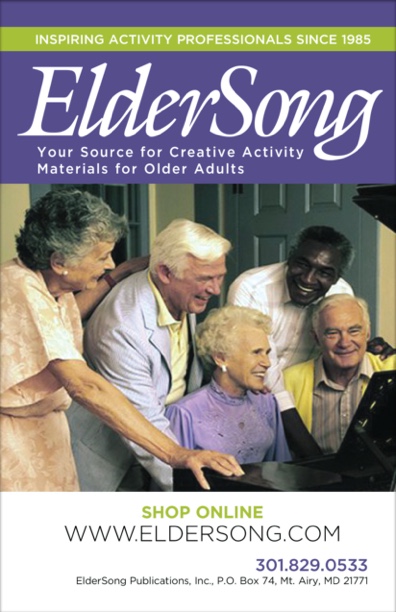Consider the words of American novelist Pearl Buck: “If you want to understand today, you have to search yesterday.” The same thing can be said of people. If you want to know your clients, start by reflecting on their personal history. This generation of senior adults has lived through numerous life-changing events in the 20th century. Which events impacted their lives and helped define who they are today? To gain some insight, consider using activities that celebrate the news and pop cultural events for a particular decade or year. Here’s how to get started, using the year 1945.
Reminisce with your group about the early part of 1945. This was a year marked by a surge of patriotism due to World War II. Some young women were entertaining soldiers and sailors at USO canteens or writing letters to service boys; others had joined the armed forces. Many young men were fighting in the war; other males were working on assembly lines at defense plants alongside women. People were listening to the popular war correspondent Ernie Pyle on the radio and reading newspapers for information on the war. Families were going to the movies to see newsreels shown between films. Americans were buying war bonds and Defense Stamps. Children were participating in air-raid drills. Rationing was a fact of life. Ask your group about the impact of World War II on their daily lives as young adults. What was happening in their community and in their homes? Old Life magazines can provide your group with photos of the frontline as well as photos from the home front.
This scene was interrupted by the sudden death of President Franklin D. Roosevelt in April 1945. (FDR had been president since 1933.) Ask your group if they remember hearing FDR’s death reported on the radio. Talk about the thousands of Americans who paid last respects to FDR as a train carried his body from Warm Springs, Georgia, to Washington, D.C. Review the presidential legacy of FDR with your group.
A second major event of the year occurred: There is a radio news flash announcing the end of the war on August 14. Ask: How did Americans celebrate the end of World War II? Where were you when you heard the news? How did you feel?
By the end of 1945, rationing had ended except for sugar. The economy had recovered and Americans went on a spending spree. They took vacations again. There was a shortage of houses. Women in war plants had to give up their jobs for returning vets. A new president, Harry Truman, occupied the White House. America now possessed the atomic bomb. How did Americans handle all of these changes?
On the home front in 1945, pop culture was flourishing. Hollywood stars, radio personalities, and musicians were entertaining the American public. Families went to the movies for a diversion. Broadway theater was in full swing. Frank Sinatra, Bing Crosby, and Perry Como had hit songs. Celebrate the year’s popular movies by showing the film adaptation of the beloved classic novel, National Velvet. In the movie, 12-year-old Elizabeth Taylor became a child star. This great family film, also starring Mickey Rooney, teaches many valuable life lessons. Discuss these with your group. Ask how many saw the film with their families. Or, enjoy the hit musical of 1945, Anchors Aweigh, which paired Frank Sinatra and Gene Kelly. Reminisce about Rodgers and Hammerstein’s Broadway stage musical Carousel with the hit songs “You’ll Never Walk Alone” and “June is Bustin’ Out All Over!” You can also watch the 1956 movie version, starring Shirley Jones and Gordon MacRae.
The Andrews Sisters were very popular in the 40s, entertaining U.S. troops. Enjoy some of their hits from 1945, sung with Bing Crosby: “Ac-Cent-Tchu-Ate the Positive” and “Rum and Coca-Cola.” Don’t forget to play their signature song “Boogie Woogie Bugle Boy.” Another possibility: invite a musician to talk about the new jazz style that emerged in the 1940s (be-bop), or groove to a recording of trumpet player Dizzy Gillespie.
THE YEAR IN REVIEW – 1945
- Where was President Franklin Roosevelt’s “Little White House” located? Warm Springs, Georgia
- In what hit film did Johnny Mercer sing his Oscar-winning song, “On the Atchison, Topeka, and the Santa Fe”? The Harvey Girls
- What was the only film in which Gene Kelly and Fred Astaire danced together? Ziegfeld Follies
- What Southern playwright wrote the 1945 smash hit on Broadway, The Glass Menagerie, which explores the conflict between love of family and self-fulfillment? Tennessee Williams
- In what popular 1945 film did Bing Crosby play a singing priest who clashes with a no-nonsense nun, played by Ingrid Bergman? The Bells of St. Mary’s
- What world leader proclaimed Vietnam to be an independent republic in 1945? Ho Chi Minh
- On what two Japanese cities was the atomic bomb dropped? Nagasaki and Hiroshima
- What popular war correspondent was killed by Japanese gunfire near Okinawa in 1945? Ernie Pyle
- What American general accepted the unconditional surrender of Japan on board the USS Missouri in Tokyo Bay in 1945? General Douglas MacArthur
- What was the name of President Harry Truman’s daughter? Margaret
THOUGHT FOR THE MONTH
Encouraging and comforting words will boost the morale of the people with whom you work. If you practice the virtue of kindness, it will become second nature to you.
“Kindness is the golden key that unlocks the heart of others.” ~ Henry Drummond
“1945 CELEBRATION” written by Sue Hansen. © 2005 ElderSong Publications, Inc. All rights reserved.
Reprint Policy: To reprint or republish all or portions of this entry, you must acquire written permission and agree to link back to the original source. Please contact us at [email protected] to obtain permission.


